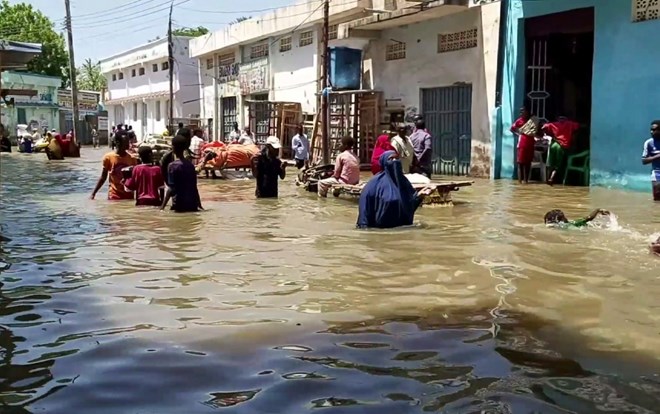
Friday October 16, 2020

In this image made from video taken Sunday, May 17, 2020, people wade through a flooded street in Beledweyne, central Somalia. Flooding in central Somalia has affected nearly 1 million people, displacing about 400,000, the United Nations said Monday, May 18, 2020 warning of possible disease outbreaks because of crowding where the displaced are seeking temporary shelter. (AP Photo)
MOGADISHU (Xinhua) -- The Somalia Humanitarian Fund (SHF) has released 9.26 million U.S. dollars to scale up priority life-saving assistance to nearly 300,000 people affected by floods in Somalia.
Adam Abdelmoula, humanitarian coordinator for Somalia said a total of 8.18 million dollars will be allocated towards priority interventions to provide food assistance, non-food items and emergency shelter, support for health facilities, water services, sanitation and hygiene (WASH).
Abdelmoula said 1.08 million dollars of the allocation will support integrated health and nutrition activities as well as integrated education, child protection and WASH activities.
"Funding from the SHF will enable aid organizations to scale up and sustain life-saving assistance to the most vulnerable flood-affected communities in the worst-affected areas in the country," he said in a statement issued in Mogadishu.
SHF is a multi-donor country-based pooled mechanism created in 2010 to allocate funding for the most urgent life-saving interventions in Somalia.
SHF funds will also support critical protection services with emphasis on child protection and gender-based violence as well as support national and international non-governmental partners operating in Banadir, Hiraan, Lower Juba, Middle Shabelle and Lower Shabelle regions.
"As the Deyr season persists, continuous donor funding will be needed to boost humanitarian operations and support recovery across Somalia," Abdelmoula said
He said the funds will also support the Logistics Cluster to ensure timely delivery of essential humanitarian goods and personnel in hard-to-reach and underserved areas.
According to the Food and Agriculture Organization of the United Nations (FAO), more than 650,000 Somalis had been forced to flee their homes since January due to flash and riverine flooding across Somalia.
Abdelmoula said vulnerable communities due to persistent climatic shocks, locust infestation and the COVID-19 pandemic, are already facing severe food and water scarcity and are at risk of deadly communicable diseases such as cholera outbreak and acute watery diarrhea (AWD).
"With limited resources and funding, the humanitarian agencies in Somalia are overstretched and in need of urgent support to provide timely and deliberate response," he added.
According to the UN, the 2020 Deyr rainy season has started with moderate to significantly heavy rains reported in Puntland and central regions of Hiraan, Bakool, Galgaduud, Mudug, Nugaal and southern areas of Sool region.
It said the communities living in the riverine areas along Juba and Shabelle rivers are at high risk of flooding as heavy rains are expected to continue in November and December.